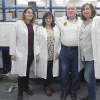In recent years, the organic food market in the EU, driven by steadily increasing demand, has developed significantly. The overall challenge faced by the organic sector is to ensure a steady growth of supply and demand, while maintaining consumers’ trust. An element to be considered is the pressure of demand that also increases the risk of fraudulent behaviours or other intentional violations. Not only do they harm consumers’ interest and cause economic damages distorting competition, but they can also negatively impact on reputation of organic operators that are complying with the rules.
In such context, JRC scientists carried out a comprehensive biochemical analysis based on untargeted liquid chromatography–mass spectrometry (LC–MS) metabolomics of carrots coming from different agronomic environments over a period of four years. Carrot samples of Nerac and Namur varieties were collected directly from paired fields from the Walloon region of Belgium, one with a conventional growing system and one with organic husbandry. The extracts (organic solvents) from the carrot samples were analysed using high performance liquid chromatography coupled with mass spectrometry. Using a strict quality control scheme, the data acquired were subsequently exported for multivariate statistical analysis.
Compounds were identified following guidelines of the Metabolomics Standards Initiative. With the use of chemometrics it was possible to classify samples according to agricultural practices and predict the origin of unknown samples. Several markers related to carbohydrate metabolism and plant defence mechanism were identified as responsible for the differences between organic and conventional agricultural systems.
This is the first time that a metabolomics approach has been used for organic food authentication purposes in a long-term (four years) field study and by using external validation sample sets to predict the origin of unknown samples. The work was published in Food Chemistry.





